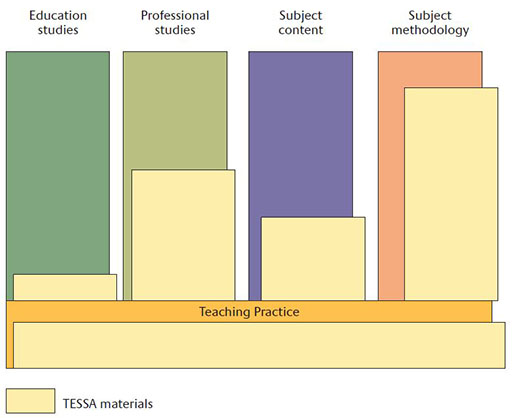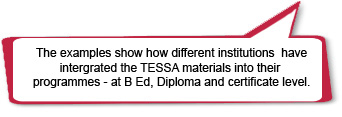2 Which TESSA materials are suitable for your teachers? [Curriculum mapping]
TESSA materials are appropriate for pre-service, in-service and upgrading programmes at a variety of levels and for teachers with a huge range of existing skills. Teacher educators working in different contexts (universities, colleges, regions and districts) are able to use them in a variety of situations and programmes.
It is important to remember that TESSA is not an entire curriculum for a formal teacher education programme. The purpose of TESSA materials is to enhance most areas of teacher education curricula and less formal teacher development activities.
Mapping into a programme
For existing formal programmes the starting point is to look at both
- your own teacher education curriculum
- the TESSA curriculum framework [Tip: hold Ctrl and click a link to open it in a new tab. (Hide tip)]
to decide where it will be most appropriate to use the TESSA materials.
The diagram shows the main areas of most teacher education curricula and the parts that TESSA supports:

Figure 2 Overlap between TESSA materials and components of a teacher education curriculum
TESSA Snapshots: TESSA use in diploma and degree programmes
At the University of Education, Winneba (Ghana), the TESSA materials are integrated into teaching methodology courses in english, maths, basic science and environmental studies in the B Ed Primary. |
At the Open University of Tanzania, the new Diploma in Primary Teacher Education was planned with the TESSA principles in mind. It has an active learning / activity based approach, linking theory and practice, and draws heavily on the TESSA materials. TESSA materials are integrated into methodology courses, teaching practice, classroom management modules and general teaching methods and strategies. |
 |
In the in-service upgrading programme – Advanced Certificate of Education – at University of Fort Hare (South Africa), the TESSA materials have been integrated into the courses which support the improvement of teaching skills in maths, science and technology. |
In many institutions there are no existing materials to support teaching practice or school experience modules, and TESSA materials are then frequently used to support this part of the curriculum. Using the materials in this way is a good starting point as it familiarises teachers (and their supervisors/tutors) with the TESSA materials and there is often less resistance to their use than to integration in more formal taught parts of the curriculum.
TESSA Snapshots: TESSA use in non-accredited programmes
The National Teachers’ Institute in Nigeria is leading on delivering CPD workshops for all primary school teachers across the country (120,000 teachers in 2009 through 246 centres). These six-day workshops cover the four core subjects of the primary school curriculum with a focus on innovative techniques of teaching. For each subject a self-study manual has been written, based on principles of active learning and targeting pupil needs and interests. In 2008, revised subject manuals were produced; these integrated relevant TESSA activities and case studies thus enriching the NTI manuals. These books are distributed to teachers at workshops.A companion Resource Person’s Guide has also been developed and is used to help orient the centre coordinators and facilitators who run the CPD workshops. |
 |
Ms Pauline Amos is a district supervisor for science working with teachers in primary schools across Nakuru district in Kenya. She uses the TESSA materials with teachers in schools in her area in less formal professional development exchanges. |
 |
Mapping into a course
Having identified the most appropriate parts of your curriculum for enhancement with TESSA, you may then want to do more detailed curriculum mapping to identify particular TESSA sections or activities to integrate into formal and less formal courses or in response to individual teacher needs. This mapping exercise is best undertaken in a workshop with colleagues. Table 2 shows how using a table can be useful to support this exercise.
| B Ed Course (primary) | Theme Topic | Suggested TESSA literacy module / section | Suggested TESSA activities / case studies | Teacher outcomes |
|---|---|---|---|---|
| Introduction to linguistics (sound production) | Articulation (pronunciation) | M1 S1 Supporting and assessing reading and writing | Activity 1: Using songs and rhymes to teach reading of words Activity 2: Using groceries for reading | Used songs and rhymes to teach pronunciation Used grocery packaging to teach pronunciation |
| Introduction to literacy (literary appreciation) | Story telling | M2 S1 Investigating stories | Activity 2 Discussing why specific stories were told Activity 1 Investigating storytelling | Investigate pupils’ understanding of stories |
| Creative Writing (Writing) | Writing a narrative | M2 S1 Investigating Stories. M2 S4 Using story and poetry | Key activity: Creating an original story Activity 1 Drafting name / praise poems or songs | Exploring ways of writing original stories / poems |
 |
When using the TESSA materials to support teachers with their teaching practice, you might select specific TESSA materials for them. Alternatively, you might ask teachers to select the most appropriate sections or study units for their own needs (from the TESSA website, CDs or printed books), and then devise their own learning pathway through the material. In both cases you will need to ensure that the school (pupil) curriculum is considered in making the selection.
It is worth bearing in mind that adequate time needs to be allocated for teachers to browse and select from the TESSA materials. Teachers will find it helpful to have access to TESSA: Working with Pupils (Teachers’ Guide) available under ‘Teacher Educator Guidance’ on the TESSA website.
TESSA Snapshot: Providing access to the TESSA website
At Our Lady of Apostles (OLA) teacher training college in Cape Coast Ghana (working with The University of Cape Coast), the student teacher’s timetable has been amended and all teachers have one session per week in the computer labs to browse and study the TESSA materials – choosing activities and resources to use in their assignments, on campus micro teaching and in teaching practice in local schools. ‘One striking revelation about the relevance of the TESSA resources is evident in the manner in which our third-year student teachers who are currently on their “out-programme” crave for the resources to prepare their lesson notes in their various schools assigned.’ |
| OLA TESSA Report February 2009 |
TESSA Snapshot: TESSA in the B Ed course at Egerton University, Kenya
‘Essentially, as far as I am concerned it is the approach that TESSA is using that is important, it is not so much the content covered. As far as anyway the TESSA materials do not cover the entire curriculum in our schools, they are giving us examples… They are giving methods we can use.’ |
| Prof Fred Keraro, Egerton University, Kenya |
A TESSA Section



